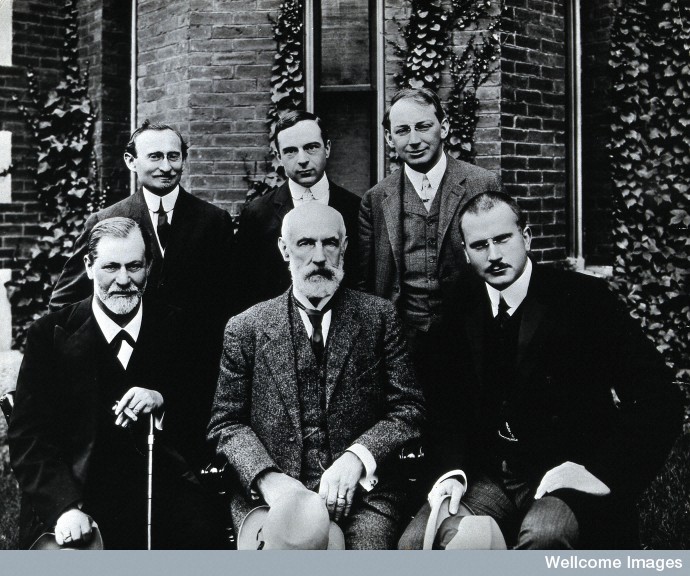Carl Jung’s Psychology of the Unconscious published in 1913

Carl Jung’s Many Intrests
Born in 1875, famous Swiss Psychotherapist and Psychiatrist Carl Gustav Jung would spend his early years developing an interest in religious history and medicine. He would go on to study at the University of Basel pursing and completing a medical degree. Yet, it would be the time spent after his degree where he would begin to create some of his most famous work. Jung joined the Burghoelzli Clinic in Zurich after graduation and would cultivate a keen interest into the complexities of the human unconscious mind.

A Diffrence in Academic Opinion
Jung would go on to travel the world and write books on his new psychoanalytical theories. Along his journeys, Jung would send a copy of one of his books “Studies in World Association” to Sigmound Freud. Impressed with Jung’s work, the equally famous Austrian neurologist Freud would offer to have him visit. Togther they would discuss ideas of the human subconscious. Jung agreed with Freud’s theories but believed there was something more that Freud hadn’t tapped into yet. They would become good friends intill parting ways due to a difference in academic opinion, as Freud would openly criticize Jung’s idea of a collective consciousness and the idea Jung developed categorizing the unconscious into archetypes.
Though this lead to the end of their friendship, this theory on archytypes would be Jung’s most famous and long lasting idea. He would also explore the religious nature behind human psychology, going back to his childhood interest in the psyoclogical impact of religion. Jung founded analytical psychology and would popularized the idea of the two personality types of introversion and extroversion. He would even go on to write many more books like “Archtypes and the Collevtive Unconscious”, “Man and his Symbols”, and “The Relations Between the Ego and the Unconscious”. Carl Jung’s work is one of the most influential and well recognized. He alone would help revolutionize psychoanalytical theories and even influence modern pop-culturte.

K-pop, Gaming, and Other Psychological Studies
Carl Jung would shape the future for studies done into Psychology. Psychotherapist and Psychiatrist would build off his work in Word Association and Divergent Veiws, Psyche and the Unconscious Mind, Archetypes, Introversion and Extroversion, and the Significance of Dreams. There would also be influence from Jung’s work that he couldn’t have forseen.
Jung would go on to also impact the Abstract and Expressionist Art movements. Painters like Jackson Pollock and Mark Rothko would use the idea on exploring the unconscious mind in their drawings and paintings. More recent pop culture references would be the international K-pop group BTS, as they would be inspired to create three albums further exploring Jung’s work into unconsciousness with their music. They would include albums tracks that are titled after Jung’s famous archtypes, “Map of the Soul: Persona”, “Map of the Soul: Ego”, and “Map of the Soul: Shadow”. Another famous reference to Jung’s work would be the video game titled Persona. Currently there are 5 very popular games in this series with characters and themes that also use the Archtypes from Jung’s work. Jung’s theories have spread to multiple platforms, mediums, and even have been explored in films. Whether it’s splatter paint art, K-pop songs, violent videogames, or Jung’s studies and books; there is a form of media accessible for all to learn from and enjoy.


Citations:
“Carl Jung’s 11 Best Books.” Exploring Your Mind, 25 Nov. 2017, https://exploringyourmind.com/carl-jungs-11-best-books/.
Erin, Adrinne. “Carl Jung’s Contributions To Psychology.” Carl Jung’s Contributions to Psychology, 10 Oct. 2019, http://www.dreampositive.info/carl-jungs-contributions-to-psychology/.
Fordham, Frieda. “Carl Jung.” Encyclopædia Britannica, Encyclopædia Britannica, Inc., https://www.britannica.com/biography/Carl-Jung.
Jay, Martin Evan. “Sigmund Freud.” Encyclopædia Britannica, Encyclopædia Britannica, Inc., 1 Oct. 2021, https://www.britannica.com/biography/Sigmund-Freud.
projects, Contributors to Wikimedia. “Carl Jung.” Wikiquote, Wikimedia Foundation, Inc., 14 Oct. 2021, https://en.wikiquote.org/wiki/Carl_Jung.
Team, GoodTherapy Editor. “Carl Jung (1875-1961).” Carl Jung Biography, GoodTherapy, 11 Nov. 2011, https://www.goodtherapy.org/famous-psychologists/carl-jung.html.
Image Citations:
Jung, C.G., and June Singer. “Books-BB Version.” New York Center for Jungian Studies, 7 May 2021, https://nyjungcenter.org/books/.
“Persona 5.” Wikipedia, Wikimedia Foundation, 2 Nov. 2021, https://en.wikipedia.org/wiki/Persona_5.
Peutherer, Jamie. “Carl Jung’s Collective Unconscious Explained: Xnanga.” Psychology, Philosophy & Self-Improvement Articles, 18 Apr. 2017, https://www.xnanga.co.uk/psychology/jungs-collective-unconscious/.
projects, Contributors to Wikimedia. “Carl Jung.” Wikiquote, Wikimedia Foundation, Inc., 14 Oct. 2021, https://en.wikiquote.org/wiki/Carl_Jung.
Ruiz, Susana L. “Analytical Psychology of C.g.jung L Psicoanalista Madrid.” Analytical Psychology of C.G.Jung l Psicoanalista Madrid, 14 Sept. 2019, https://bienestarpsicoanalisis.com/analytical-psychology/.